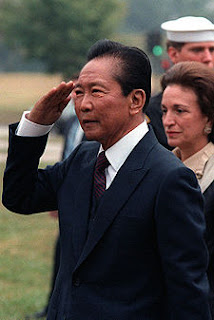 Photo Taken From:
Photo Taken From:The Philippines has a debt, or utang, worth 52.5 BILLION U.S. Dollars ( as of the time of this writing, the first week of July in 2009, 1 US Dollar is equivalent to around 48 Philippine Pesos). If you are a Pinoy, you are one of those obligated to pay it back. Now, how do you do that?
It sounds like an insane amount. We Pinoys can easily imagine taking a Pag-Ibig FUND loan of around 2 Million Philippine Pesos to be able to secure a house and lot for our families. 2 Million PHP is equivalent to around 40,000 or so US Dollars. Can you in your wildest dreams imagine taking a Pag-Ibig FUND loan worth 52.5 Billion US Dollars, or the equivalent of around 2 Trillion 520 Billion PHP? ( Don't bother counting the zeroes ).
If you have that much cash with you, it probably means you won the Lotto each and every day for 2 months in a row. Or maybe 3 months in a row. Or maybe a year. Such an amount is that big. With a Pag-Ibig FUND loan like that, you could probably buy three or more SM Supermalls...including all the merchandise inside.
A 2 Million PHP loan is in itself quite a burden enough to repay, and most Pinoys would even prefer to pay it back within 25 long years, just so's it wouldn't be too much of a burden on the wallet. How much more a TRILLION Pesos worth of utang?
Would any single person be stratospherically mad enough to secure an utang like that?
Hilariously enough, there is. Just search the name "Bernard Madoff" on the Internet, and you'll discover that this stupid person actually has a debt to hundreds, maybe thousands, of people that is said to be worth a total of around 65 BILLION US Dollars. That's even bigger than the utang of the whole Philippine nation! It's so preposterously humongous that Bernard Madoff was recently sentenced to 150 years in prison for not being able to repay that utang. He was condemned as a swindler and a thief for committing the biggest, most unbelievable fraud in human history. To get a sense of how much money 65 Billion US Dollars is, money experts recommend that you imagine stringing together 1 Dollar bills side-by-side lengthwise. That string of money could stretch from the Earth to the Moon and back to Earth again 12 times.
Well, the Philippines seems to be better off than Mr. Madoff, because instead of just one Pinoy having the 52.5 Billion US Dollar-utang, it's the whole population that shoulders it. That means we are 60 or 80 million souls who are supposed to pay it back to our creditors. If it's also any consolation, that much money strung together in 1 Dollar bills might only stretch from the Earth to the Moon and back to Earth again only 10 times instead of 12. Perhaps.
But how can we repay an amount like that? Would it be as simple as paying for a typical Pag-Ibig FUND loan? Can we settle it in 25 years? It is imminent that each and every Pinoy is obligated to pay this loan back, so we'd better find a way to do it.
Do we raise taxes? Do we send more OFW's abroad, so that their remittances grow exponentially? Do we sell all SM Supermalls in the Philippines on E-Bay? Can we just simply tell our creditors, "Oh Hell! That's a stupid amount! I refuse to pay it back!"
The floor is open to suggestions! Again, how do we pay off an utang worth 52.5 Billion US Dollars?
Photo Taken From:






























